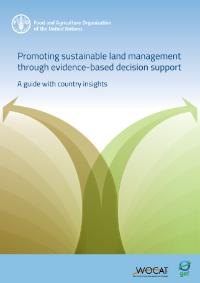Promoting sustainable land management through evidence-based decision support
This publication is a product of the GEF-funded FAO project ‘Decision Support for Mainstreaming and Scaling Out Sustainable Land Management (DS-SLM)’ which has developed a decision support framework (DSF). The DSF integrates experience from work with land degradation (LD) and SLM into an overall strategy for mainstreaming and scaling out SLM at different spatial and temporal scales. This publication serves as a step-by-step guide for the application and implementation of the DSF during planning, design and implementation of SLM interventions.






